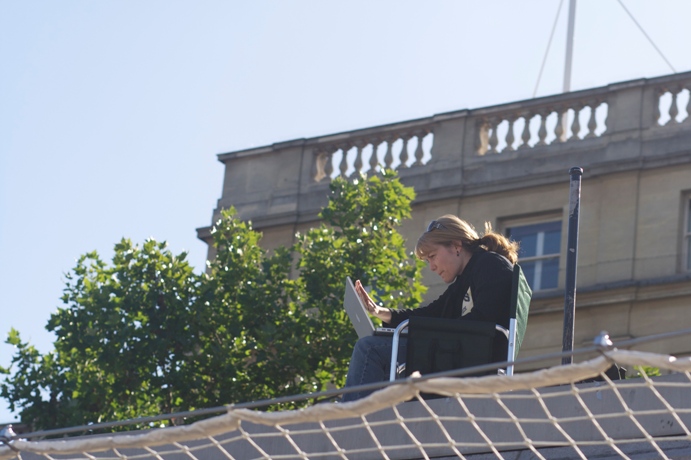the broadside series
#16
Blue Fifth Review
Volume IX. Issue 6
November 2009

on the Plinth, London, Summer 2009
( Atlanta, Georgia )
poem & comment

Monumentalan exquisite corpse
“I contain multitudes.” –Walt WhitmanOr is it? Each of us just going our own way down a busy street on a sunny, London summer day, steel drums tinnily sounding out the thin air pulsing with possibilities, the rhythm of the unknown finds itself a vexing question. The question being: “How can multitudes of monuments ever approach the peace within us all?” When the Thames was London's sewer, the monumental stench reached even here. The trees swaying, voices humming, she begins to see words floating in binary, like the way she's seen half her life simmer on the page to a vapor misting the past, blurring the future. She asked the question, "What?" saw within her marble bones, a twisting of leaves, all dark ease and favor that spoke the voice of rivers and sea beyond, coming at last to rest and silent dusk._______________
Poets who contributed (with Twitter IDs):Collin Kelley: @CollinKelley
Rupert Fike: @RupertF
Ivy Alvarez: @IvyAlvarez
Christine Swint: @yoginipoet
Robert E. Wood: @emmetirl
JC Reilly: @Aishatonu
Julie Bloemeke: @juliebloemeke
David-Matthew Barnes: @xoxodmb
Sam Rasnake: @SamRasnake
Karen Head: @poetphd
and from the ground via transcription: Alex Buchanan ( bio ) and Amy Regan ( bio )._______________
* Mini-documentary from Time, covering Head’s Plinth Twitter project: Twitter Poetry on the Plinth in London
* Video broadcast of Head’s entire hour on the Plinth: from One and Other
Head comments on her Twitter poem project - adapted from her blog post:
When I first discovered I’d won a lottery spot for Antony Gormley’s One and Other Project on the Fourth Plinth in Trafalgar Square, I had no idea what specifically I would do with my slot. I just knew I wanted to do something involving poetry and other poets. It is very easy to disappear into your art. Many artists do this even to the exclusion of their potential audience(s), which explains why they often find themselves without an audience. Another way artists limit themselves is by never collaborating with other artists.
When I came to GA Tech six years ago, my sense of collaboration wasn’t very strong. Teaching at an engineering school will cure you of that quickly. I began collaborating with people like Jay David Bolter and Maria Engberg, through the Wesley Center for New Media. As I became more and more interested in Digital Poetry, and more and more aware of my paltry technical skills, I began to get creative about ways to include others in the art I wanted to produce. The results were exhilarating and rewarding. The Plinth exquisite corpse Twitter project represents my third, and most broadly collaborative, digital poetry project.
In many ways, I conceived my hour as a kind of microcosm of what Gormley wanted to represent on a much larger scale. Too many people have come to think of art as something that happens when one artist creates something and then other people, in a very individualized way, experience that creation. This is especially true for poetry, but it doesn’t have to be this way. My hour on the Plinth was a way to stand with others (in the square and virtually), thereby turning it into “our hour” on the Plinth. Of course, such collaboration doesn't come without risks.
My biggest concern was that technology would fail me. I knew I could write the poem on paper with contributions from the crowd, but it would be difficult and much more limiting. You really see that tension in the first minutes of the full broadcast. I was so worried that the technology would fail, that I forgot to announce what we would be attempting. This was frustrating for some people watching. My apologies to you! Then there was the form, exquisite corpse, which frankly can produce some pretty awful poetry. You simply never know what you will get. But, that didn’t happen either. The poem, “Monumental,” is pretty good, as you can finally see here in this broadside, which is the poem faithfully transcribed without editing—exactly as it was created in that hour.
I encourage all writers, and readers, to find opportunities to collaborate on art projects. Ultimately I believe the wider the circle of collaborators, the greater potential you can connect with a much broader audience.